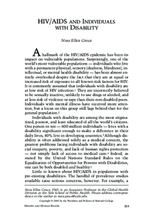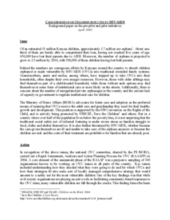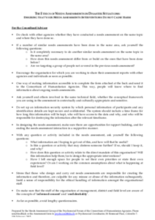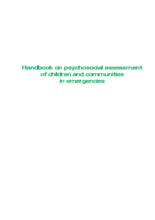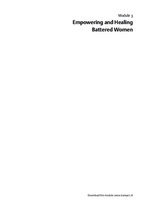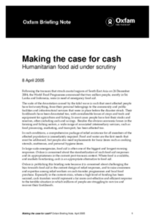Demographic Data
|
Sources: World Bank, UNICEF, UNDP HDR 2015, DHS 2013 |
Displaying 14011 - 14020 of 14551
Documents a unique survey on the impact of AIDS on populations of disabled people. Particular emphasis on identifying disability-specific concerns.
Comprehensive framework and resource guide intended to aid a situation analysis of orphans and vulnerable children. Includes relevant example analyses to illustrate the available variety of approaches and their components.
A simple, one-page form designed to assess child protection needs in immediate relief situations.
Outlines the impact of a pre-pilot conditional cash transfer scheme implemented in Kenya and defines key issues to be considered before moving forward into pilot and national schemes. Short annexes include tools/frameworks to guide implementation.
Lists ethical “do’s and dont's” specific to Consultants/Advisors, Managers/Supervisors, and Field-Level Workers arranging and conducting Needs Assessments in disaster situations.
A guidebook focusing on the assessment to be conducted when an emergency first hits or just after a major event in an armed conflict. Outlines the preparation needs of an assessment team and describes what an assessment should concentrate on.
Outlines the critical issues for children associated with armed conflict. Includes recommended strategies for preventing child recruitment and promoting reintegration.
Examines child protection issues for young girls associated with armed groups. Provides comprehensive policy recommendations.
Training manual for a three-day course (targeted at care workers) on domestic violence. Focus on empowering battered women to find safety and regain control.
Briefing note advocating cash transfers in disaster relief, with a particular focus on operations in Sri Lanka and Indonesia following the tsunami in 2004.

